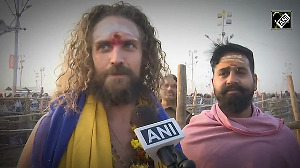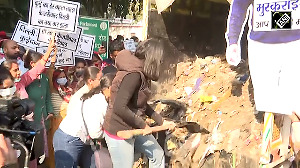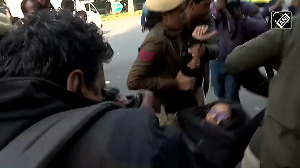Religious groups are unhappy with Supreme Court's expression of regret on the non-implementation of the Uniform Civil Code during a ruling on a petition pertaining to the Indian Succession Act on Wednesday
This, however, is not the first time the apex court has advocated a common civil code.
Article 44 of the Constitution, under the Directive Principles of State Policy, says, "The State shall endeavour to secure for the citizens a Uniform Civil Code throughout the territory of India."
But currently Hindus, Muslims, Christians and Sikhs follow their own religious laws in the issues of marriage, divorce and inheritance.
Surprisingly, some women's groups have expressed their dismay at the SC's observations.
S Q R Ilyas of the All India Muslim Personal Law Board told rediff.com, "It is against the fundamental principles of the Constitution. It is against the religious freedom enshrined by the Constitution to the people of India."
The three-judge bench comprising Chief Justice V N Khare, Justice S B Sinha and Justice A R Lakshmanan observed that a common civil code would help national integration.
The observation came during a judgment on a writ petition filed by Christian priest John Vallamattom against certain provisions of the Indian Succession Act putting restrictions on Christians from donating their property for religious and charitable purpose by a will.
"It is a matter of regret that Article 44 of the Constitution has not been given effect to. Parliament is still to step in for framing a common civil code in the country. A common civil code will help the cause of national integration by removing the contradictions based on ideologies," Justice Khare in the judgment said.
But Ilyas said, "Sharia (Islamic law) is an integral part of Islam. Implementation of Uniform Civil Code would mean depriving Muslims and many communities from their personal laws and fundamental right to religion."
"Sharia is a law made by God. It is not made by any human being. Therefore nobody has the right to intervene into it. Not even Muslims," he added. "Islamic scholars or Ulemas can take a position on issues where the holy Koran and Sunna (Prophet's sayings) are silent."
When told there are different laws in different Muslim countries, he said, "The basic laws are almost same everywhere. There are differences on issues of marriage and divorce in different school of thoughts. So the law of a particular school is followed in a country where the majority of the people follow that school. Otherwise there is no difference."
Saiba Faroqui, general secretary of the voluntary group National Federation of Indian Women, said, "The court should have avoided such comments in the current situation of the country."
"BJP, RSS and VHP will use such observations in the coming elections. After the sectarian violence in Gujarat, Muslims are feeling insecure. So the fundamentalist forces will get an opportunity to further corner and alienate Muslims from the mainstream," she said.
"No matter how, good intentioned the judges may be but such issues will only cause problems."
Though Faroqui opposes the Muslim Personal Law, she feels it should not be interfered with at present.
"It is true that women are not getting justice in Muslim Personal Law. But any reform has to come from within Muslim women. Law is not the solution," she said. "In such a hostile situation, Muslims would not be ready to accept a uniform code."
"Muslims are educationally and economically backward. If the government is really concerned about equality then they should work on these fields rather than touching the emotional issue of uniform civil code," she suggested.
Dominic Emmanuel, spokesperson of Delhi Catholic Archdiocese, said, "The Supreme Court should make it clear in what areas the Uniform Civil Code will affect the life of the people."
"Also it depends on the government's urge to implement it," he added.
"If the government makes it compulsory that everybody will have to wear helmet while driving, then will it ask Sikhs to take off their turbans? Or if the government legalises abortion to control population growth, will the Christians accept it? Or if the government legalises killing of cows, will it not hurt Hindus?" he asked.
"So it has to be dealt with carefully. Religion is a sentimental and sacred issue in India. Government should listen to everybody before doing anything."
The Rashtriya Swayamsevak Sangh and Vishwa Hindu Parishad, however, welcomed the Supreme Court's order.
The RSS also threw the gauntlet at the opposition parties asking whether they would respect it in the same manner they wanted the saffron outfits to abide by the judicial verdict on Ayodhya.
The VHP asked the government to immediately implement the UCC.
Supreme Court lawyer and constitutional expert Prashant Bhushan also welcomed the judgment.
"It is a good judgment and the government should implement Uniform Civil Code. It is also in the directive principles," he said. "The fact that there is no common civil code, it gives a handle to communal forces to say that Muslims are pampered."
"If a common code comes into effect, it will have enlightened laws from all personal laws. Many things in the Hindu law will change," he added.






 © 2025
© 2025